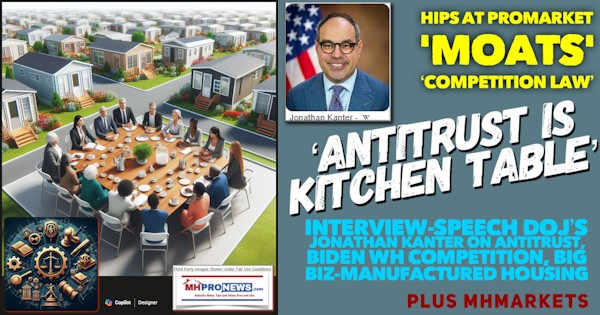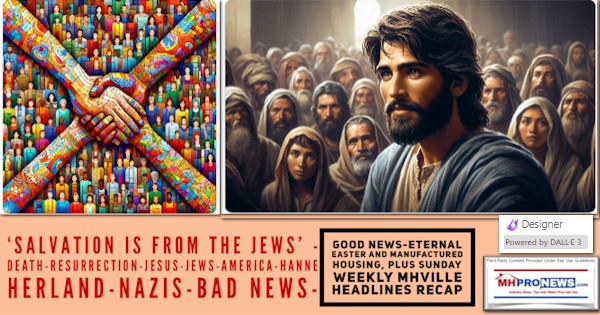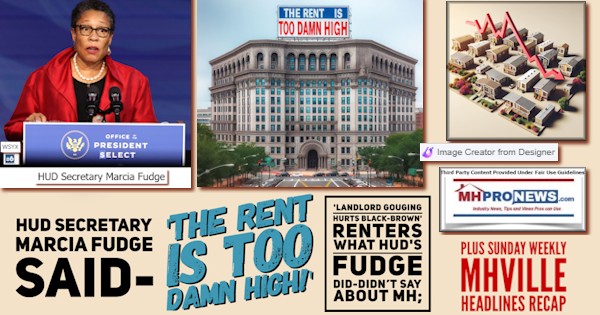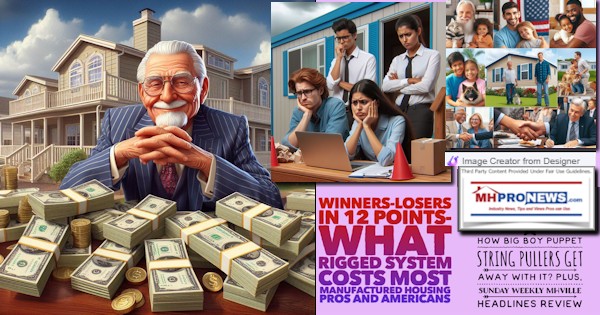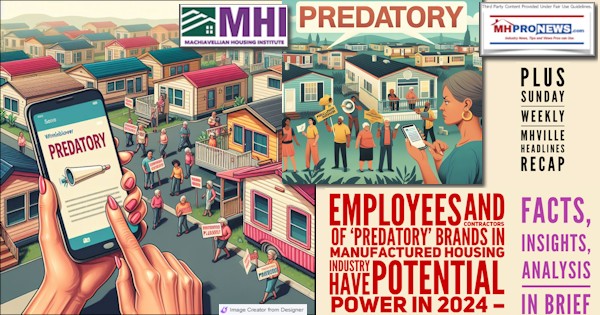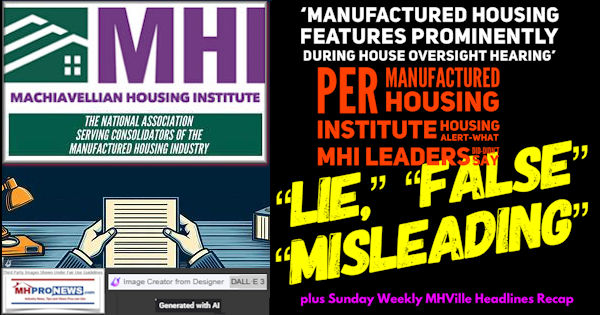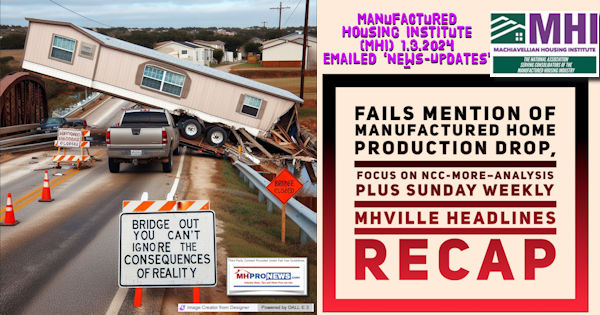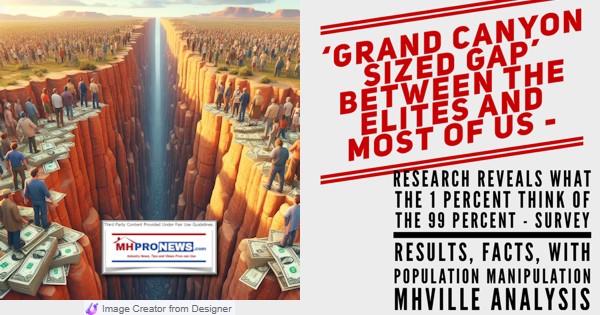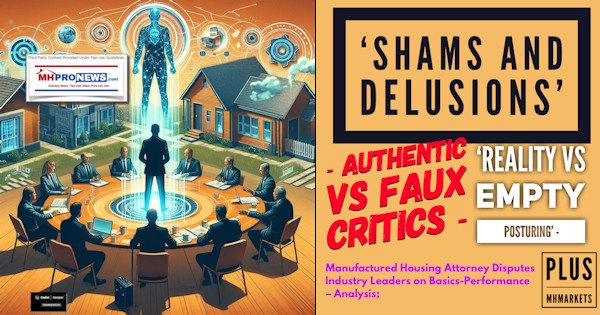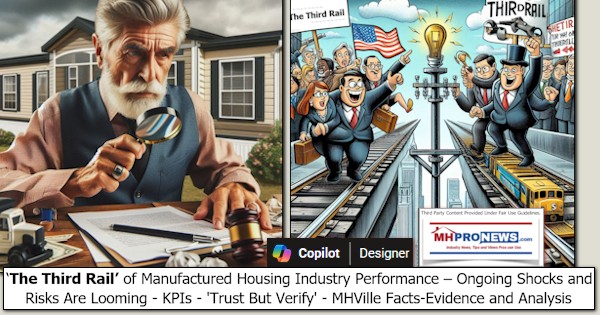
Every profession has its Key Performance Indicators (KPIs). Manufactured housing is no different. In the recreational vehicle (RV) or automotive industries it is common to report the actual production volume as a KPI. In conventional housing and real estate, the number of “housing starts” or existing homes sold are also reported. By contrast, based on behavior, those in the Manufactured Housing Institute (MHI) orbit seem to think that the KPI that matters most is reporting industry consolidation as measured by the manufactured home community (MHC) properties and other industry businesses that are trading hands. To grasp the analogy in this 15th anniversary article with analysis, according to left-leaning Wikipedia.
“The third rail of a nation’s politics is a metaphor for any issue so controversial that it is “charged” and “untouchable” to the extent that any politician or public official who dares to broach the subject will invariably suffer politically. The metaphor comes from the high-voltage third rail in some electric railway systems.
Touching a third rail can result in electrocution, so usage of the metaphor in political situations relates to the risk of “political suicide” that a person would face by raising certain taboo subjects or having points of view that are either censored, shunned or considered highly controversial or offensive to advocate or even mention.
It [i.e.: the third rail] is most commonly used in North America. Though commonly attributed to Tip O’Neill,[1] Speaker of the United States House of Representatives from 1977 to 1987, it seems to have been coined by O’Neill aide Kirk O’Donnell in 1982 in reference to Social Security.[2][3]”
In manufactured housing it seems that truth telling is, as Wikipedia’s definition put it: “either censored, shunned or considered highly controversial or offensive to advocate or even mention.”
Yet, if manufactured housing is ever to regain its once impressive status as the runaway biggest volume provider of affordable yet not taxpayer subsidized housing in the U.S., the root causes and cures to the problem of manufactured housing industry performance would have to be explored and those evidence-based stories told.
Part I
1) In the summer of 2009, the longtime flagship of manufactured home print and later online publishing, the Manufactured Home Merchandiser Magazine closed its doors, as had several other manufactured home trade media like the Manufactured Housing Institute (MHI) linked Modern Homes before it. As a production graphic included with this reveals, 2009 was the “bottom” of the manufactured home industry’s long slide in production of new HUD Code manufactured homes from its recent heydays in the mid-to-late 1990s. L. A. “Tony” Kovach and his wife Soheyla Kovach made the decision to fill the information vacuum with an entirely online publication. Initially called MHMarketingSalesManagement.com, that publication is known today as ManufacturedHomeProNews.com (MHProNews.com). MHProNews has been called the “preeminent” trade media serving the manufactured housing industry by a later rival publisher.

“Tony,
Congratulations on the 5th Anniversary of MHProNews, and thanks for your tireless efforts in providing the industry with this valuable news service.
Best regards,
Dan …”
2) Rinzema later said in 2015 in talking about the loss of lending in MHVille the following.
“The Manufactured Home industry was collapsing and in near free-fall. 14 out the then active 18 national and regional lenders (all of which were our customers) either went bankrupt or exited MH lending. The remaining 4 cut back their chattel lending drastically. Datacomp’s appraisal volume declined by about 80%, but we were able to quickly reduce costs to just about breakeven. Since our intention had never been to be a “non-profit” corporation, we began the process of trying to figure out how to reinvent ourselves.”
3) That’s not just a Rinzema observation. It is natural for any professional or business to step back and reevaluate when a sharp decline occurs to step back and evaluate what has gone wrong and what can be done about it. The quote-illustration that follows from the late Zig Ziglar makes that commonsense approach used by Rinzema and countless others over the years clear.
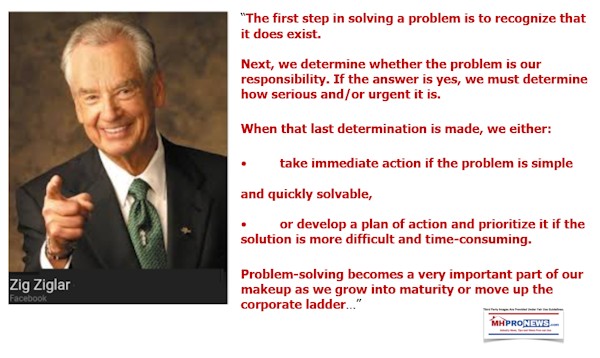
4) Fast-forward to 2024.
When a business or an industry is “collapsing” – to use Rinzema’s phrase – or suffered a collapse, the natural instinct of business and authentic association leaders is to determine out what was going wrong and then “figure out how to reinvent ourselves.”
5) The information and years of praise from professionals in or beyond MHVille that follow reflects the enduring value of this affordable manufactured housing industry trade media. This comment for publication was initially missed in time for yesterday’s related article but was thoughtfully resent and received by MHProNews on 10.15.2024.
Tony,
Congratulations on the 15th Anniversary of MHProNews, and more specifically, congratulations to you for initiating, maintaining and preserving this important service, against all odds, for our great industry and our deserving consumers.
I say this because before you started MHProNews, our industry was in dire need of a hard-hitting, truth-seeking and truth-telling independent investigative journalist and publisher who would spend time to understand not only the complicated business structure of our industry, but also the complex regulatory and legal matters which distinguish it and drastically impact its members, while reporting such information accurately and objectively, regardless of who may be pleased or offended. This is quite important because, as an industry that is comprehensively regulated by federal, state and local governments, both industry members and consumers need and deserve this vital information.
You understood this need and acted accordingly by creating the MHProNews, and the rest is history.
Congratulations again,
Danny
Danny D. Ghorbani
Founder and First President & CEO of MHARR.

6) While the kind words for our publication are appreciated, there are several reasons why Danny Ghorbani’s insights are relevant to contemporary manufactured housing professionals. In no particular order of importance, one could include the fact that Ghorbani’s training is in engineering. Engineers are fact-, evidence-, and performance-focused. By training, engineers tend to be clinical and logical.
7) Ghorbani was an MHI vice president for years. But like several other past MHI presidents, CEOs, and vice presidents, his name is not to be found on the MHI website. Ghorbani is an “unperson” in the Orwellian sense that left-leaning Bing’s AI powered Copilot said appears to fit MHI’s behavior and communications style.
8) Ghorbani’s career dates back to the industry’s true heydays, when the then mobile home industry had experienced such explosive growth that in the early 1970s, production surpassed 500,000 new homes and were threatening to hit 600,000 new units per year. Ghorbani helped develop 200,000 new sites for those homes, per the RV-MH Hall of Fame. Ghorbani was there when mobile homes were transitioned into manufactured housing by Congressional enactment of what came to be known as the HUD Code for manufactured housing which went into effect on June 15, 1976. Ghorbani was deeply involved in the enactment of the Manufactured Housing Improvement Act of 2000 (a.k.a.: MHIA 2000, MHIA, 2000 Reform Law, 2000 Reform Act). Ghorbani was serving MHARR – and by extensions consumers and the industry – when the Duty to Serve (DTS) manufactured housing was made federal law as part of the Housing and Economic Recovery Act of 2008 (HERA).
9) Which brings us back to Rinzema’s comments quoted above.
To be clear, let’s stipulate that ‘liar loans,’ be it on conventional or manufactured housing, are obviously wrong and may constitute fraud and other legal woes. Beyond the immorality/illegality of behavior that occurred in manufactured housing in the later years of 1990s (and later occurred in conventional housing in the run up to the 2008 housing/financial crisis), Warren Buffett led Berkshire Hathaway (BRK) dumped their shares in Fannie Mae and Freddie Mac.
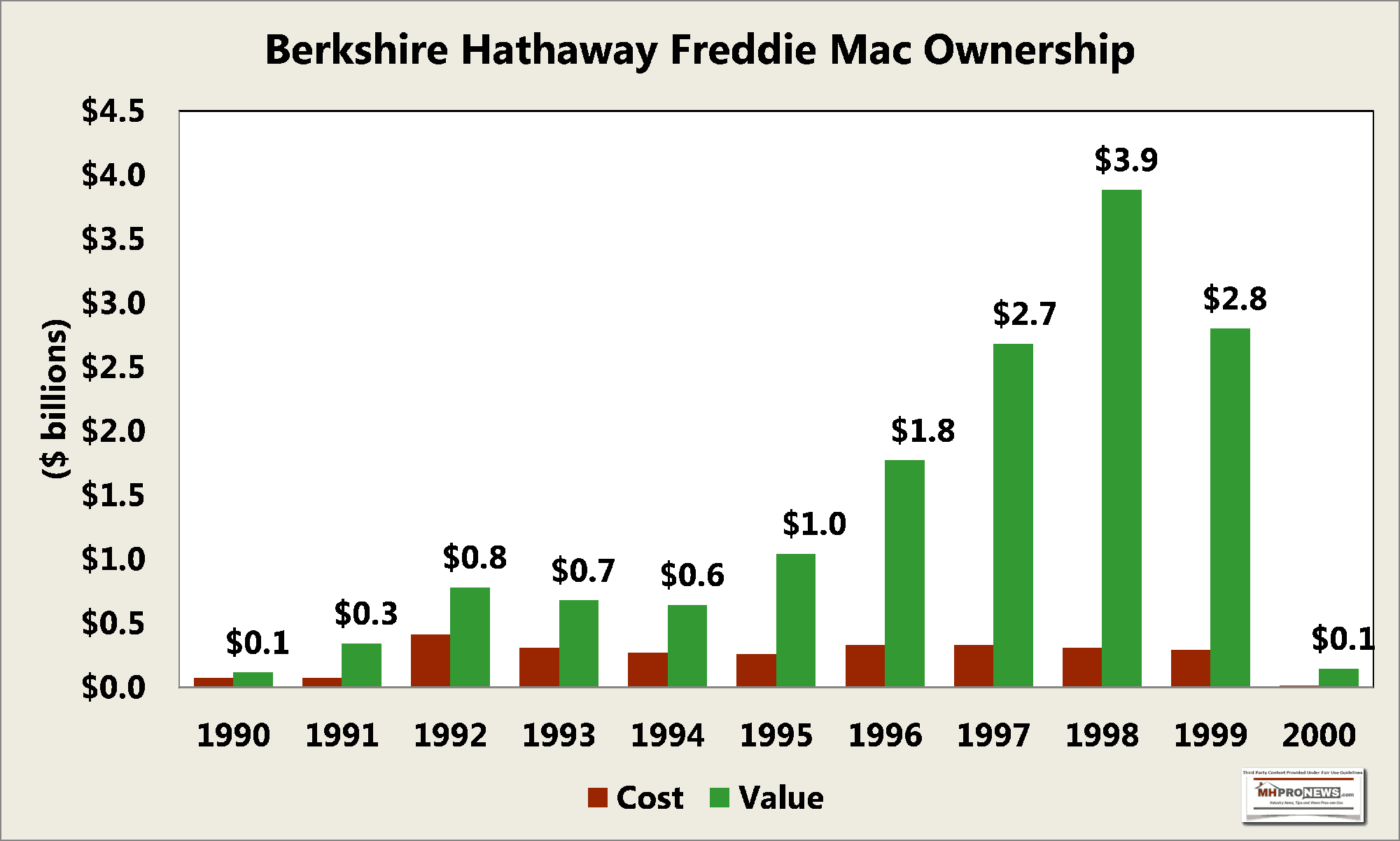
10) Buffett was later called on to testify to members of Congress about that selloff of stocks. A more detailed look at the financial side of the manufactured housing industry’s meltdown are detailed in the reports that follow.
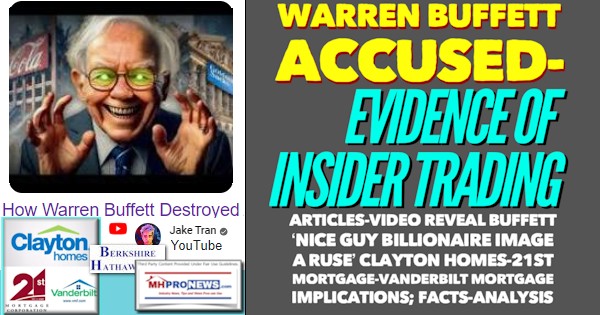
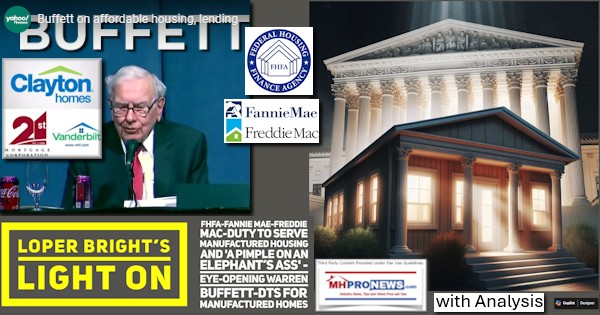
11) In the wake of that meltdown of chattel lending for HUD Code manufactured homes, the remaining manufactured housing lenders had to shore up any potential weaknesses in their lending practices.

12) The loss of lending, in a finance-reliant business, meant the sales of manufactured homes plummeted. MHI lifetime achievement award in financing, Marty Lavin, J.D., said in a video interview posted below that the bad practices of the past had been addressed.
13) MHI President and CEO Chris Stinebert, who was hired to work collaboratively with Ghorbani and MHARR to get the MHIA 2000 enacted, said in an interview in 2004 that the industry was through its repo-fueled rough patch and was ready to recover to its mid-to-late 1990s levels.
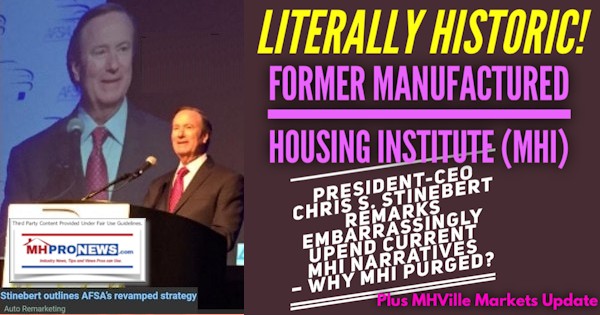
14) But the evidence is clear that manufactured housing industry did not recover to the levels achieved in the late 1990s, did it? So, back to Rinzema’s lesson, where is MHI’s self-examination to see why the industry is performing so poorly during an affordable housing crisis? Because that is what Ziglar, Rinzema, and scores of professionals in a range of professions would say is the natural thing to do.
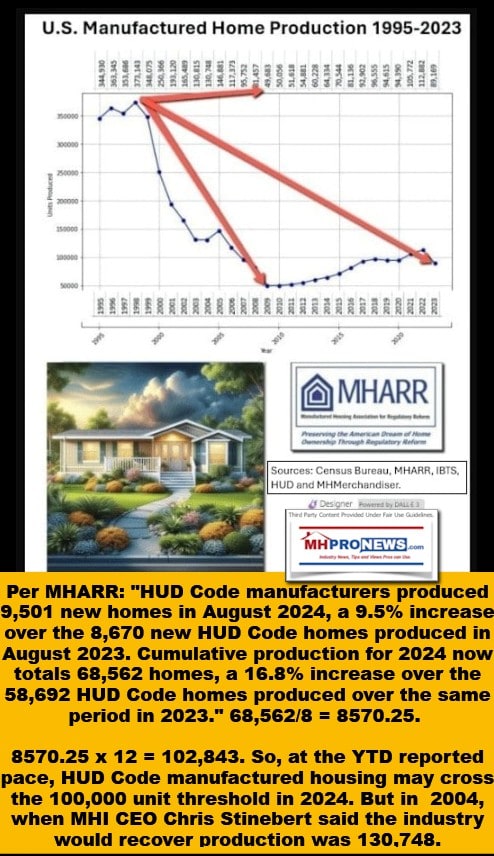
15) “Every day is an IQ test,” muses WMAL’s award-winning pundit Chris Plante. Cripple lending and of course manufactured home sales would plunge.
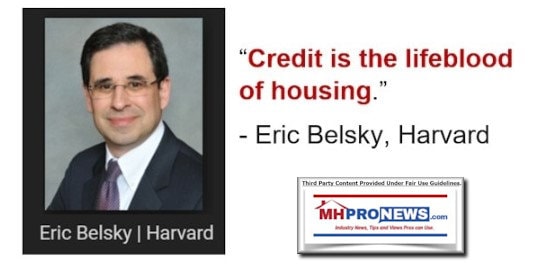
16) As MHProNews exclusively reported, Sam Zell said the following at an MHI event.

“No competitive financing is a serious impediment to growing.”
“There is no bigger issue than having an established credit base.”
“We as an industry should have created that (credit base) a long time ago.”
That is just one month shy of the now late Zell’s remarks from 11 years ago. How long does it take for MHI leaders and insiders to fix what is so obviously wrong?
17) But that was supposed to have been addressed by HERA and DTS, among other efforts. The question then becomes why didn’t MHI press that law effectively? After all, lending is a post-production issue that is not in MHARR’s core focus of federal regulations on producers.
18) It was during that plunge in production, fueled in part by the loss of lending that Rinzema, MHARR, Lavin, and Stinebert all cited as important factors in the sharp drop of manufactured housing sales, when Buffett led Berkshire bought a big interest in bankrupt Oakwood Homes Corporation (OH and OKWHQ) in 2002 and then bought Clayton Homes and their associated lending in outright in 2003. Oakwood was tucked under the Clayton umbrella.
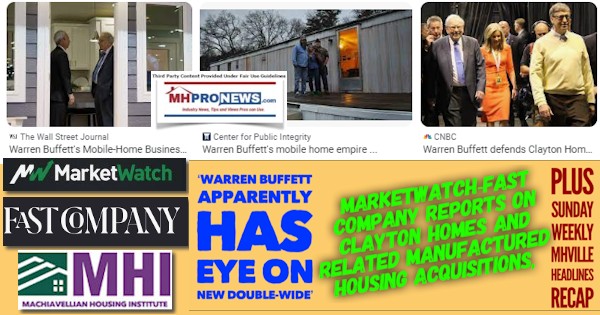
19) The industry’s decline and tepid recovery is largely in areas that are post-production. MHI, or “the Institute” as outside MHI attorney David Goch has on occasion referred to the Arlington, VA based trade group, has the responsibility of achieving the industry’s potential. That’s part of why they say they are collecting dues from members. IF MHI leaders were as busy figuring out what is necessary for manufactured housing to recover as their former president and CEO Stinebert said was the goal, they are certainly going about that in slow, slow, slow motion.

20) Among MHI’s publicly traded members are Legacy Housing (LEGH) and UMH Properties (UMH). It should be obvious that despite the “awards” given to UMH, that they are not part of the insider’s club. Despite helping to pay for MHI events or helping pay for a display unit at the Innovative Housing Showcase, it ought to be apparent that the Landy’s are in MHI’s murky middle, an apparent white hat operation that is rubbing shoulders with black and gray hats. MHI member Frank Rolfe from time to time spills the beans on what others of his ilk, as well as souls capable of independent thinking, known to be true. MHI is part of the problem and is not part of the solution. Rolfe ripped the UMH-Landy pitch for tripling the numbers of land-lease manufactured home communities as “asinine.” It goes against the more common notion among MHI’s consolidation-focused insiders that development is to be kept modest, unlike for example, the multi-family housing industry, where hundreds of thousands of new apartments are built every year. It is Rolfe and his crowd that ought to sit back and figure out what it is that the Landys’ have proven works.
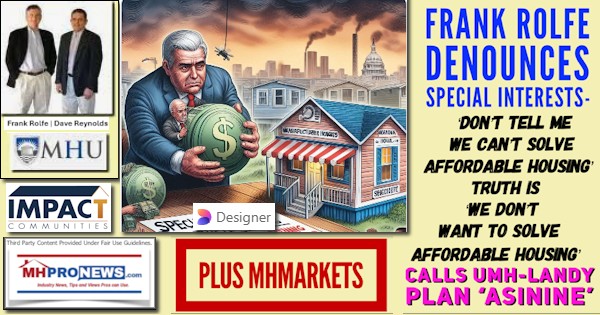
21) That slip of the lip by Rolfe aside, he does seem to have a point that there is no serious desire on the part of key public officials and many in business to authentically solve the affordable housing crisis. In the view of some it is more profitable to keep housing higher cost. That, of course, results in homelessness, which despite huge spending for HUD under Biden-Harris has increased.
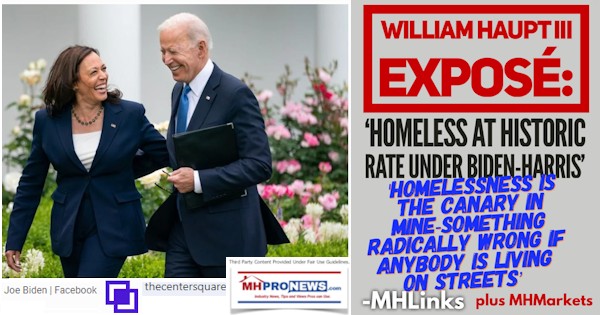
22) Legacy Housing’s Curt Hodges, who has been selling shares of LEGH stock for some time, has said several times that the single biggest hurdle for manufactured housing is what he called the place to put challenge. Unlike UMH, Legacy appears to be less interested in attending MHI meetings, unless they see an opportunity to sell product. They are apparently pragmatic in that sense.
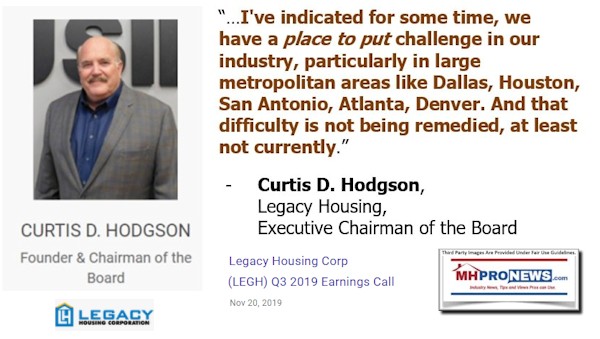
23) More recently, Legacy’s CEO Duncan Bates has also said that the biggest headwind facing the manufactured home industry are the barriers caused by zoning and placement restrictions.
![DuncanBatesPhotoLegacyHousingLogoQuoteZoningBarriersLookBiggestHeadwindIinThisEntireIndustryIsWhereToPut[HUDCodeManufactured]HomesMHProNews](http://www.manufacturedhomepronews.com/wp-content/uploads/2023/11/DuncanBatesPhotoLegacyHousingLogoQuoteZoningBarriersLookBiggestHeadwindIinThisEntireIndustryIsWhereToPutHUDCodeManufacturedHomesMHProNews.jpg)
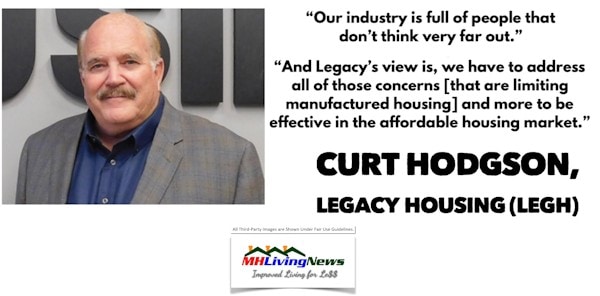
24) Our industry’s other trade media and bloggers routinely ignore such evidence and obviously relevant remarks. It is also apparent that others in MHVille trade media are much more cozy with consolidators in MHVille. Meanwhile, smaller firms may feel the pressures of regulatory, political, economic, familial, or other stress factors that can cause some to exit in frustration or desperation.

25) MHI state association affiliates know what is occurring, but apparently are all too often playing the look the other way game.
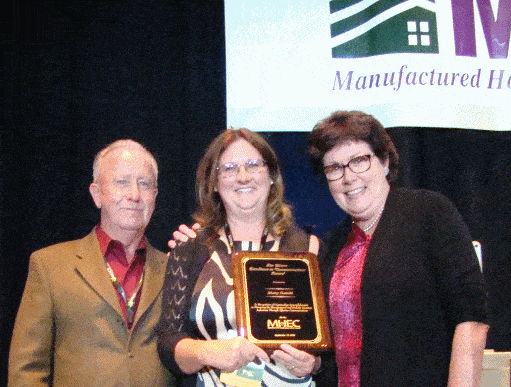
Mary Gaiski, center.
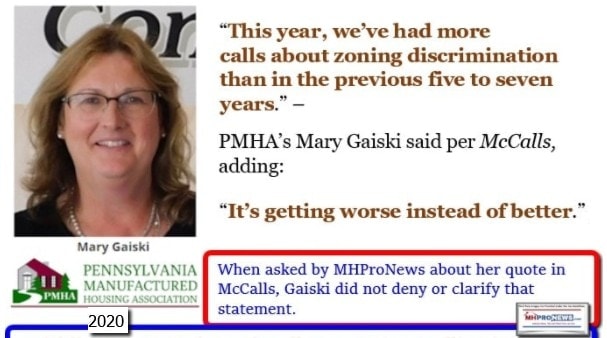
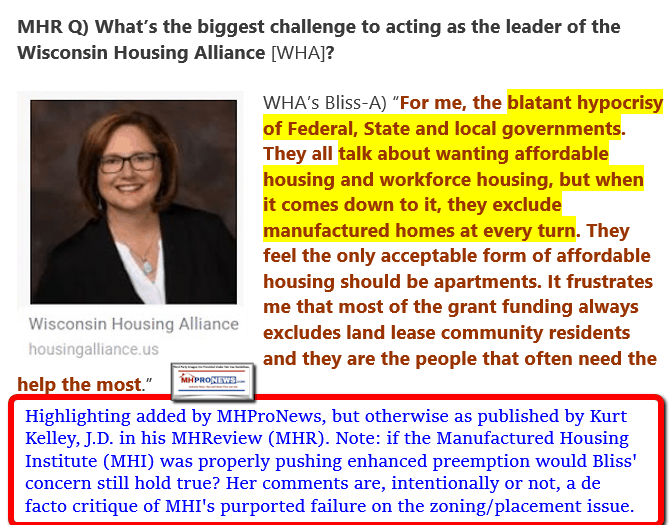
26) The game played by MHI acolytes and insiders seems simple. Posture like they care. Posture and palter like they are busy doing something. Hold meetings. Talk about the latest photo or video op as if the photo or video itself proved something other than the fact that they have access to public officials that they don’t use to get existing federal laws properly enforced. Hand out awards. Get awards or recognition. Point to those awards and praise of a circle of MHI cheerleaders who are busily create the illusory effect that something is occurring, when the KPI of embarrassingly low production tells the true tale. Author Upton Sinclair put it like this, although he could have included women in his remarks too.

27) MHARR’s Mark Weiss said it well years ago when he observed that there is an “Illusion of Motion” at work in manufactured housing, apparently, at MHI.
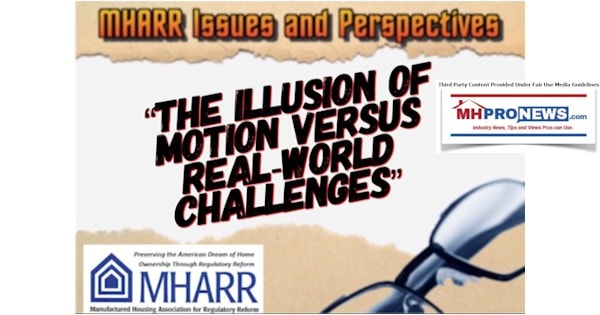
28) Danny Ghorbani, in exclusive remarks to MHProNews, phrased it like this.
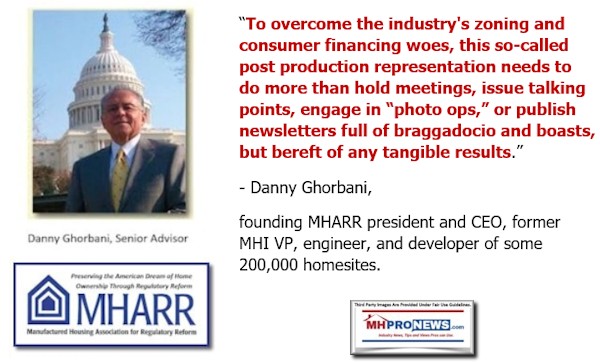
29) Mark Weiss, J.D., President and CEO of MHARR has been pressing the issues of zoning, financing, and energy regulations consistently and persistently, even though much of that is beyond their core mission. Though MHI failed to give MHARR credit, it was apparently MHARR that raised the subject of multi-unit manufactured homes. Others in MHVille trade media, or MHI itself could have said as much. So, why didn’t they? Isn’t it as bad to posture or claim victory for something that wasn’t done by MHI as it is to plagiarize parts of speeches (Joe Biden-D), elements of her book (Kamala Harris-D), or claim valor, hunting skills, and ranks that were not earned (Gov. Tim Walz-MN-D)?
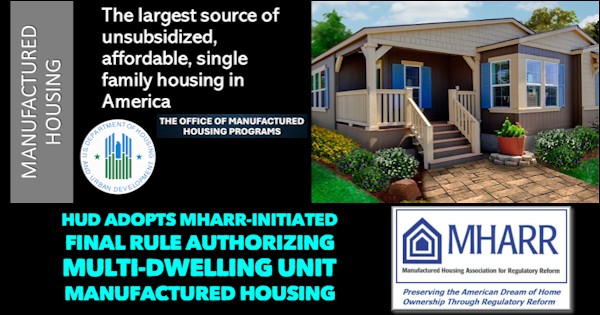
30) If MHI seriously wanted to see organic growth, they would do what they did circa 1998. Namely, join forces with MHARR and work together to get the 2000 Reform Law passed. For a time, MHI and MHARR did seem to be working together to get the 2000 Reform Act enforced, as the documents once posted and available on the MHI website reveal.
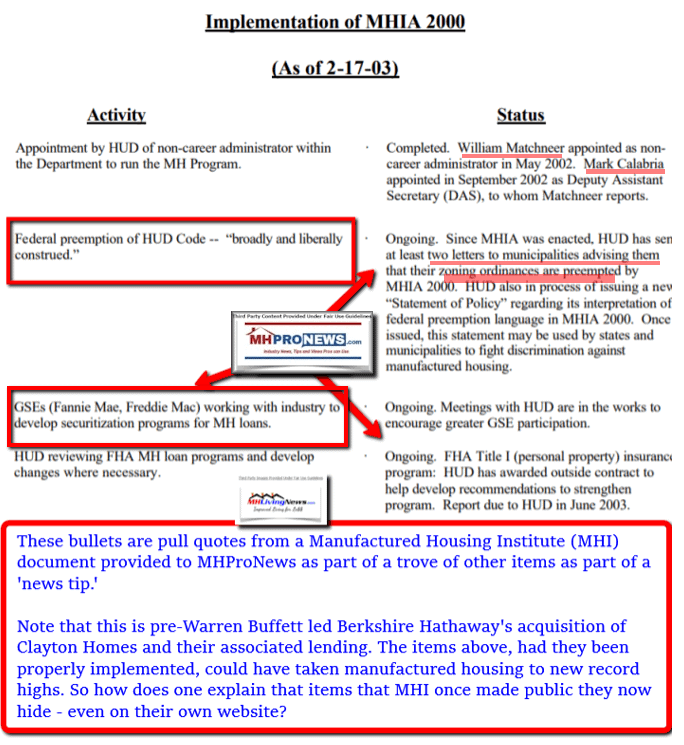
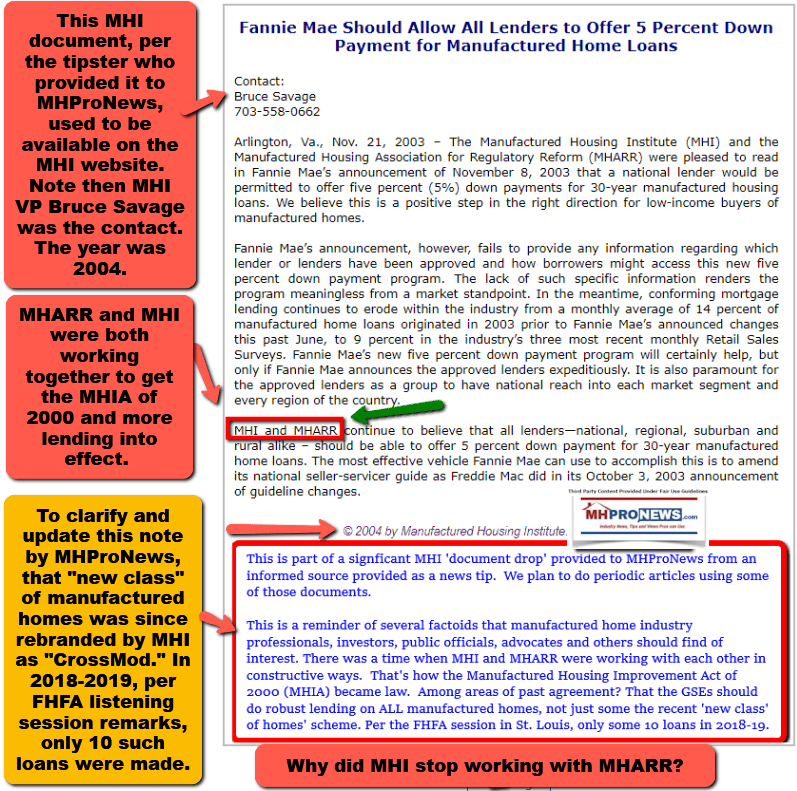
31) MHARR has had face to face meetings that press issues that MHI, if they were sincere, would ask to be involved in or would do something similar themselves. But instead, MHI is busily working with conventional housing trade groups to get what they want while getting what, exactly, for manufactured housing in return?
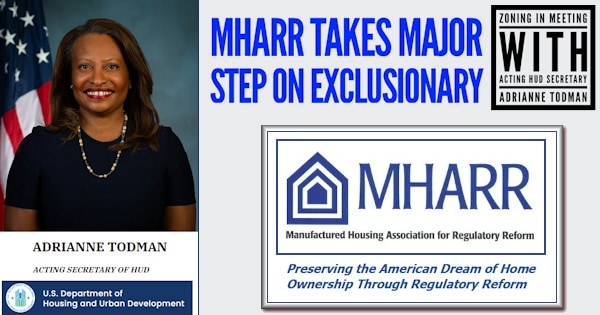

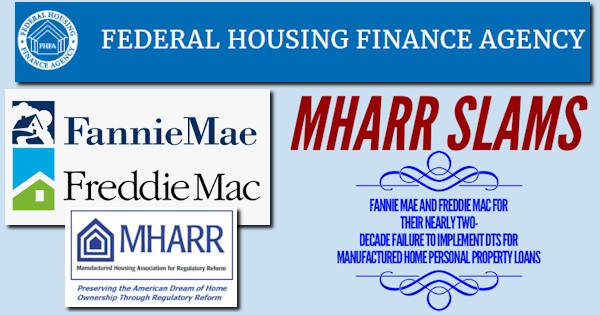
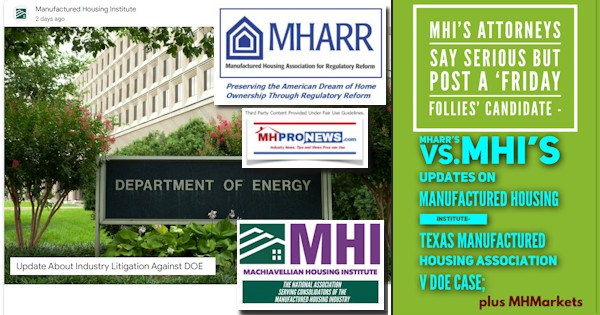
32) Per AMAC.us on this date: “Doveryai, no proveryai.” “Trust, but verify.” – Ronald Reagan, a Russian phrase he repeated often during arms control talks.” That should be applied to manufactured housing in general and to MHI and its insiders, because it is they who say the represent all segments of the industry. That means, they hold a share in the responsibility for the industry’s historic and long-term downturn.
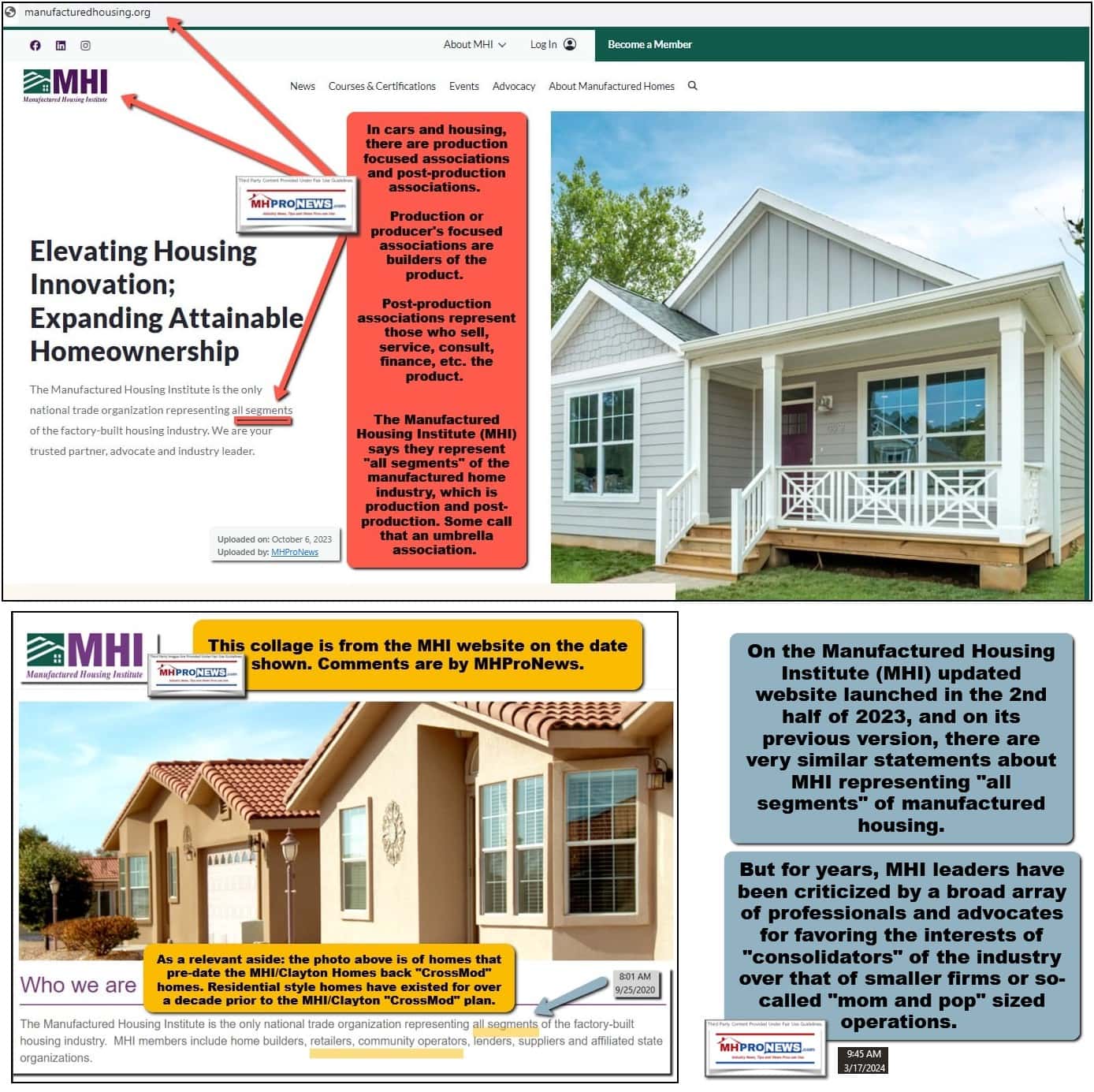
33) What changed at MHI? Is it connected to the Buffett-moves into MHVille? Is it linked to the efforts of consolidators who seem to be more focused on how many properties or once-independent businesses that they can buy than they are in seeing manufactured housing industry production to return to its historic norms. To learn more, see the linked reports and the first installment of this series linked below. Because no one else in MHVille trade media are telling these evidence-backed reports. Some, at least, have admitted as much. Programming notice: MHProNews has in hand a new research document that will shed still more light on these issues. Stay tuned for something that you won’t likely find anywhere else in MHVille trade media, here at your runaway number 1 source for “Industry News, Tips, and Views Pros Can Use” © where “We Provide, You Decide.” ©
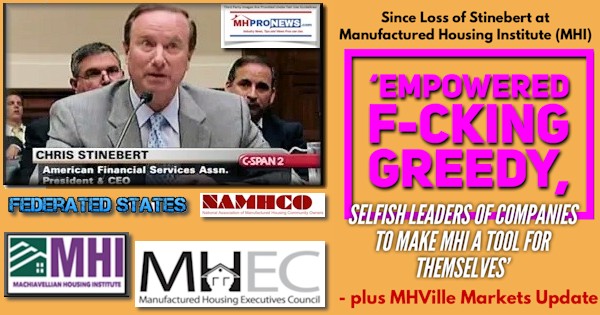

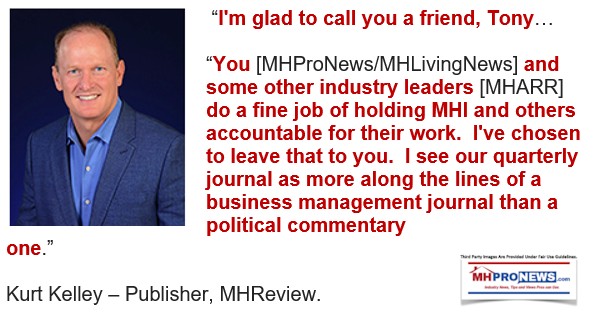
Notice: just because someone shared words of praise about MHProNews that should not be construed as an endorsement of that person’s behavior in MHVille. Click the image below or the link here to see the quotes graphic below full sized. Depending on your device or browser, click the image, and follow the prompts to increase the size.
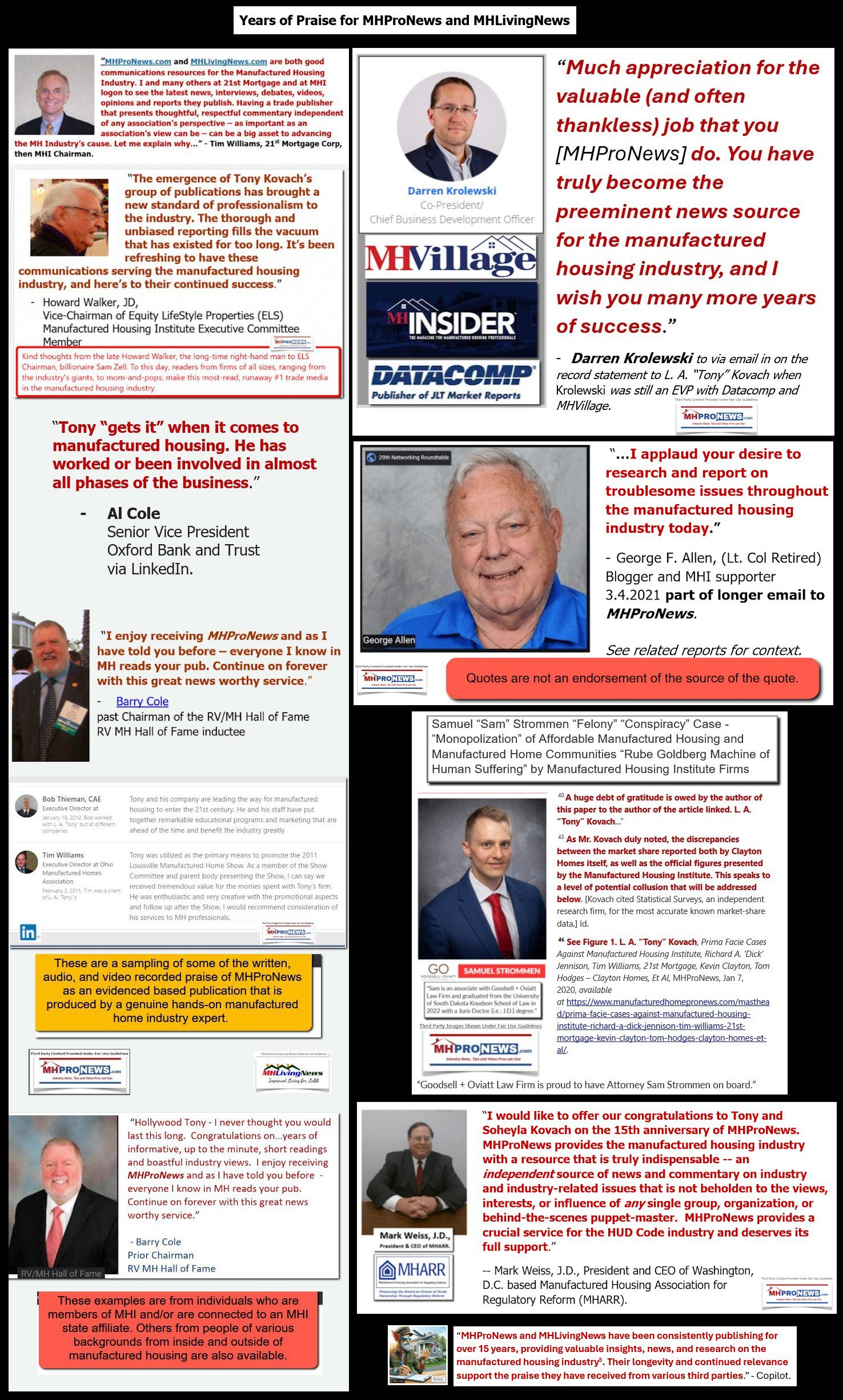

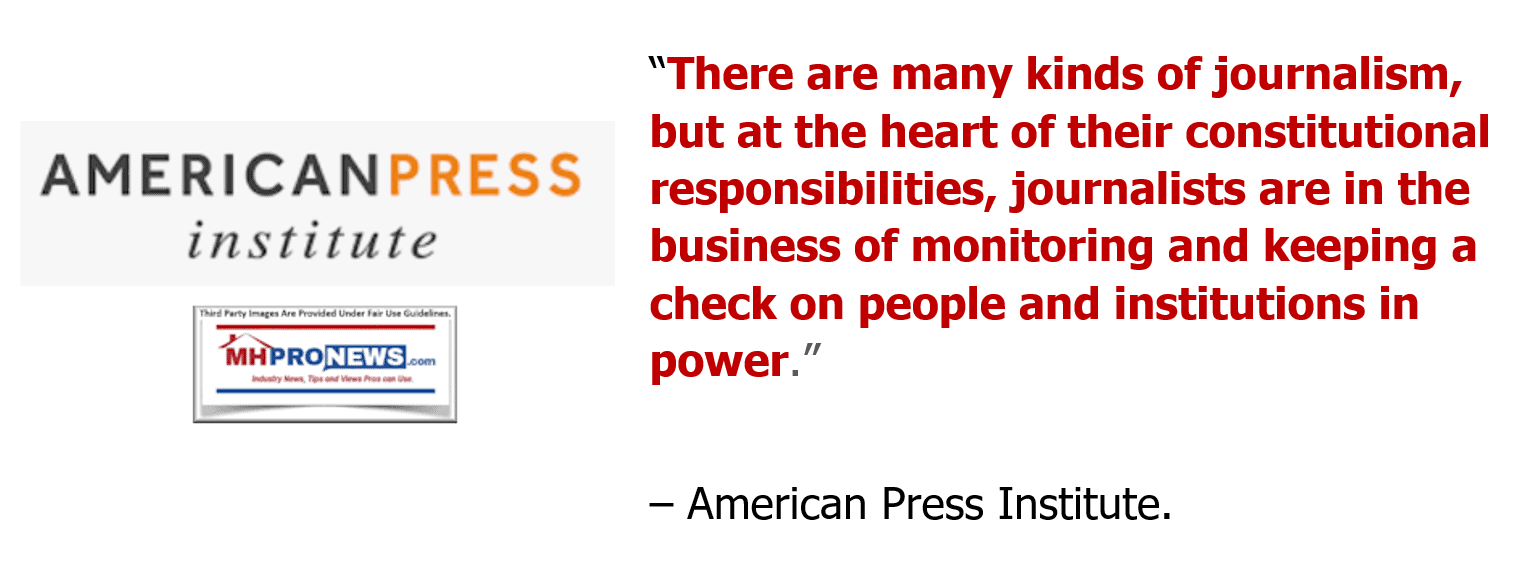


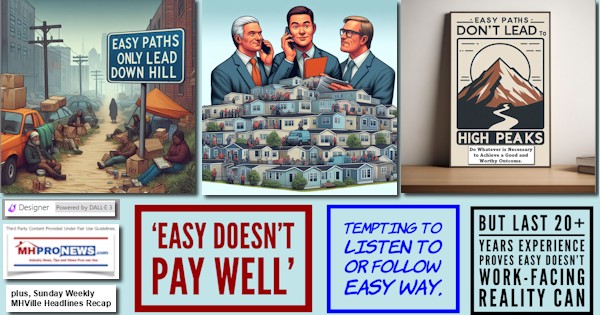
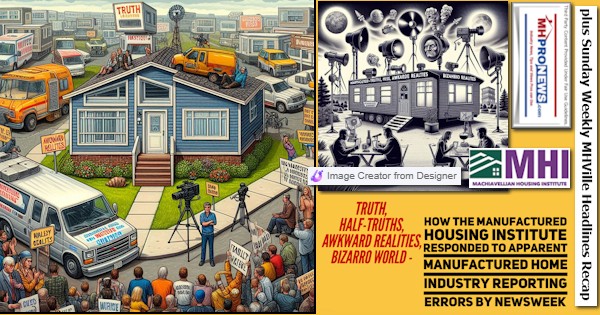
Again, our thanks to free email subscribers and all readers like you, as well as our tipsters/sources, sponsors and God for making and keeping us the runaway number one source for authentic “News through the lens of manufactured homes and factory-built housing” © where “We Provide, You Decide.” © ## (Affordable housing, manufactured homes, reports, fact-checks, analysis, and commentary. Third-party images or content are provided under fair use guidelines for media.) See Related Reports, further below. Text/image boxes often are hot-linked to other reports that can be access by clicking on them.)

By L.A. “Tony” Kovach – for MHProNews.com.
Tony earned a journalism scholarship and earned numerous awards in history and in manufactured housing.
For example, he earned the prestigious Lottinville Award in history from the University of Oklahoma, where he studied history and business management. He’s a managing member and co-founder of LifeStyle Factory Homes, LLC, the parent company to MHProNews, and MHLivingNews.com.
This article reflects the LLC’s and/or the writer’s position and may or may not reflect the views of sponsors or supporters.
Connect on LinkedIn: http://www.linkedin.com/in/latonykovach
Related References:
The text/image boxes below are linked to other reports, which can be accessed by clicking on them.’
